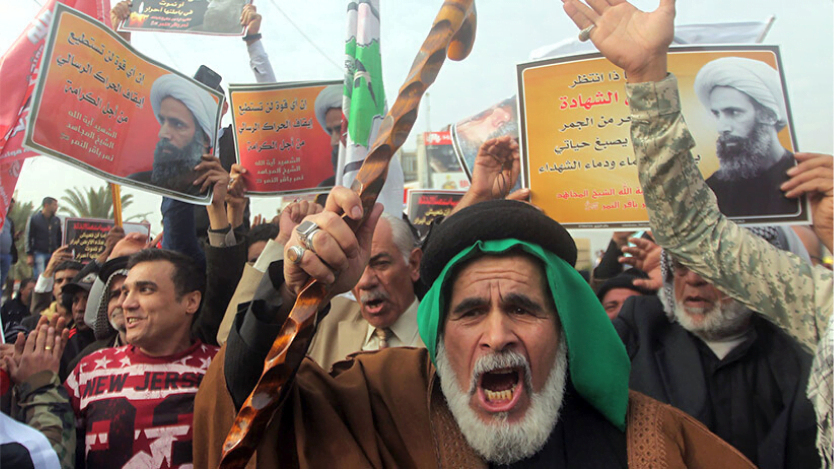
In the Name of Allah, the All-Beneficent, the All-Merciful.
May Allah bless Muhammad and his Family and damn their enemies.
In a recent lecture, His Eminence, Sheikh al-Habib, shed light on the cause of the catastrophic loss of Al-Ahsa and Al-Qatif about one hundred years ago, when the thugs of Ibn Su’ud, the founder of so-called Saudi Arabia, claimed those incredibly resource-rich regions.
The loss, as he described, was due to a number of factors—the most significant being low morale, which also contributed greatly to the recent fall of Afghanistan at the hands of the terrorist ‘Sunni’ Taliban movement.
The lecture was delivered on the 7th night of Muharram, 1442 Hijri/2021, titled ”The Fall of Afghanistan & A New Era of Taliban Terrorism,” in Al-Muhassin Mosque (peace be upon him), Minor Land of Fadak.
His Eminence began his lecture by reminding the listeners that he previously warned that the ‘Sunni’ terrorist organisation known as the Taliban is likely to return to power unless serious action is taken to prevent that from happening.
He warned that the return of the Taliban means the return of all acts of brutal terror, especially those directed at the Shi’a, followers of Ahl al-Bayt (peace be upon them), who suffered for centuries at the hands of extremist ‘Sunnis’. His Eminence also warned that the return of the Taliban would, once again, turn Afghanistan into a harbour for terrorists and an exporter of global terror.
Sheikh al-Habib revealed – and criticised – events from our past showcasing the catastrophic decisions made by our predecessors in Al-Ahsa and Al-Qatif in the so-called Saudi Arabia of today, which allowed the Wahabi thugs of Abd Al-Aziz Bin Su’ud to conquer and control those Shi’a-majority regions. His Eminence explained how low morale and a lack of foresight meant that the Shi’a of that period placed themselves at the mercy of the Wahabis and set in motion events that were hugely detrimental for the Shi’a of future generations.
His Eminence compared the loss of Afghanistan to the ‘Sunni’ terrorist movement known as Taliban to the loss of Al-Ahsa and Al-Qatif. Both losses were due to the same reason: a lack of morale driven by widespread fear.
But how did Al-Ahsa and Al-Qatif fall to the thugs of Su’ud?
As his Eminence explained, Al-Ahsa fell to a mere 300 men. Abd Al-Aziz Bin Su’ud surrounded the city with his men and sent messengers to the Shi’a leaders and scholars, such as Musa BuKhamseen, demanding that they surrender. He also demanded that they pressure the Turks, who were the occupiers of Al-Ahsa at the time, to withdraw their men from the city. He had his men spread rumours that he was coming with a massive army to take Al-Ahsa, which caused widespread fear, leading to the surrender of the Shi’a leaders to Ibn Su’ud in 1913. (Inside the Kingdom, by Robert Lacey.)
Furthermore, the capture of Al-Qatif was even far more embarrassing. Historical records show that no more than ten men took it, as Ibn Su’ud took advantage of the enormous victory in Al-Ahsa and used it as a psychological tool to ensure a quick and easy victory in Al-Qatif.
His Eminence described how Al-Qatif was split into two camps: the first group lacked the will to fight and chose surrender, headed by Sheikh Ali Bin Hassan Al-Khnizi, while the other group called for resistance and Jihad, led by Al-‘Allama Sheikh Hassan Ali Al-Bader. Besides making threats, Ibn Su’ud made promises and guaranteed that he would not suppress the religious beliefs of the Shi’a people of Al-Qatif; however, those who called for resistance warned that Ibn Su’ud cannot be trusted but found very little support.
His Eminence warned that one of the most dangerous causes of catastrophes is low morale. A defeated spirit, fear, and panic were why Al-Ahsa and Al-Qatif fell in the past and why Afghanistan fell in the present.
He also pointed out that those who fight for wages cannot defeat those who fight for their beliefs, even if their beliefs are wrong.
What happened in Al-Ahsa, Al-Qatif, and Afghanistan is, as his Eminence put it, an example of what the Commander of the Faithful (peace be upon him) warned about when he said: ”Those who fear shall fail,” ”failure and fear are connected,” and ”defeatists shall not know victory.”
His Eminence linked the defeat in Afghanistan to the decision made by the leaders of Al-Ahsa and Al-Qatif to surrender their resource-rich lands to the thugs of Ibn Su’ud, who in turn used their newfound wealth to spread their extremist Wahabi ideology throughout the globe.
To prevent such catastrophes from happening again in the future, his Eminence set out a number of steps we must all take:
- We must have confidence in ourselves and ensure that our self-confidence and confidence in Allah (Exalted is He) are inseparable. When we obey and fear Allah, everything else will come to fear us.
- Our ethics and morals must match the Imams (peace be upon them) so that we can wipe away fear from our hearts.
- We must stand firm and remain vigilant and not give in to frustration and despair.
To summarise, his Eminence declared that the only thing that can rid the world of terror is us, the Shi’a of Ahl al-Bayt (peace be upon them), because we fight fearlessly for our beliefs, our only purpose being Allah’s approval.
To accomplish that goal, His Eminence called for a formation of a global force made up of Shi’a fighters to rid the world of terror once and for all.
His Eminence concluded the lecture by quoting a narration by the Commander of the Faithful, who said: ”If you wish to attain honour without a tribe, respect without supremacy, wealth without money, and obedience without spending, then leave behind the disgrace of disobeying Allah and move towards the glory of His obedience, then all shall be yours.
The Office of Sheikh al-Habib


